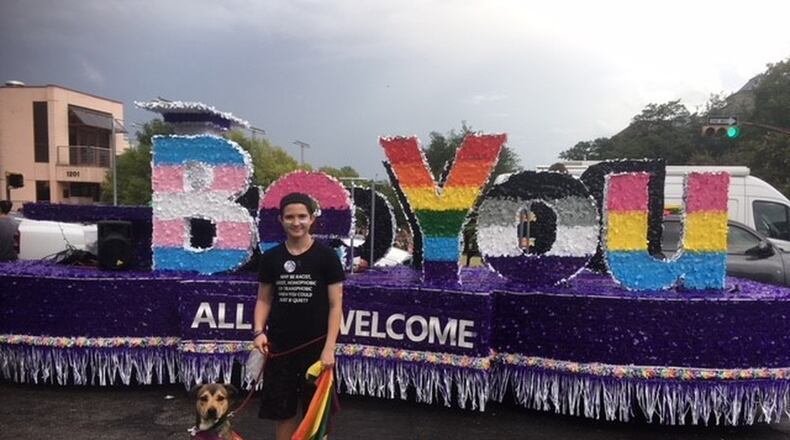Jay had cleaned out his room, dresser and closet, getting rid of things that made him sad. Jay says “sad” is not a strong enough word. “The dresses made me feel invalid, miserable, anguished and heavy-hearted,” he told me.
The dresses don’t fit anymore. I don’t mean that just in the literal sense.
My Jay is transgender. I don’t really care what that means to you. To me, it means that I have a brave child who is true to himself.
So, this summer, on my quest to climb Kilimanjaro and help Water To Thrive — a charity that builds wells in rural Africa — I gave away those dresses.
They were a reminder that no one saw Jay as he saw himself. I saw these dresses differently.
I was graced with three healthy children. Jay, 14, is my baby.
I remember the dress with red apples he wore for the first day of kindergarten, the pink Sleeping Beauty Halloween play dress, the white First Communion gown and others. All these are captured in snapshots.
When packing for my climb, I cried sorting through girlie clothes, not because of loss, but because I hadn’t fathomed how challenging a transgender life was — and is — for my son.
My heart ripped because I failed to notice my son’s silent screams that grew louder over time. Over a two-year period, my consistent A-plus student began not turning in schoolwork and failing. School nurse visits turned into doctor visits that eventually became hospital stays. I thought Jay’s depression was the result of my divorcing his dad after an almost 20-year marriage.
I was so wrong. I must atone for that.
Our lives have changed. We are now stronger and truer to ourselves.
Jay was the first transgender kid to play on his middle school football team — and use the boy’s bathroom. No court cases were involved, just caring people — Austin school district teachers, counselors and administrators — who realize small things to adults are huge to those wonderful beings we are growing into adults.
I am thankful for them.
Jay attended an international summer camp as a male last year. The camp board changed rules for him.
He wasn’t the only transgender youth at camp this year. Among international flags greeting campers was a rainbow one. Jay says that flag wasn’t there before.
“Mom, no one knew!” he told me happily about completely passing as male.
It’s daunting when a child is braver than the parent. It’s been challenging with weekly hormone shots, explaining Jay’s coming out to family, and reminding them to say “him,” “son” and “boy” after almost 15 years of saying “her.”
But it will never be as challenging as it is for my Jay.
He is shouting with the loudest voice I have ever known. Jay is extraordinary. So, I had to think of something to do with his dresses to do him justice.
I took those dresses on my journey to Kilimanjaro.
I climbed.
I prayed.
I breathed.
I thought this mountain isn’t as high as the one Jay will climb in his life.
My mind wandered to other kids who must make the same climb as Jay, with or without support. I wish I could hoist them all up the mountain, providing the dignity and love they deserve.
I hope they are true to themselves and know they are loved, respected and honored.
Foundations build in small, slow ways.
Me, a Hispanic, Catholic, divorced mama who grew up in rural Texas, where “transgender” wasn’t even a word, marched with Jay in the Austin Pride parade last weekend.
And, I gave away those dresses.
I carried some in my backpack. I’d gaze around surveying if one of the dresses — sizes 2 to 12 — might fit a child. If I didn’t see anyone, through Swahili interpreters, I’d ask if villagers had young daughters.
When I could find an internet connection, I texted Jay about them:
• A hotel clerk in Arusha, with a 4-year-old, got three, including Sleeping Beauty.
• A baker in Boma got a paisley dress for his 7-year-old.
• I gave dresses to Maasai tribal girls by a dry riverbed near Kiteto.
Before ascending the mountain, I left the last one, a toddler’s navy sailor dress, on the bus seat, sure that it would find a home. “One of these men must have a daughter,” I told the guide.
No one knew the meaning of these gestures.
But I did.
Jay would never see these dresses again. They were on another continent. There would be no reminders of what was, only what is.
I am not letting go of a daughter. I am embracing a son.
Herrera is a teacher with the Austin Independent School District.
About the Author
